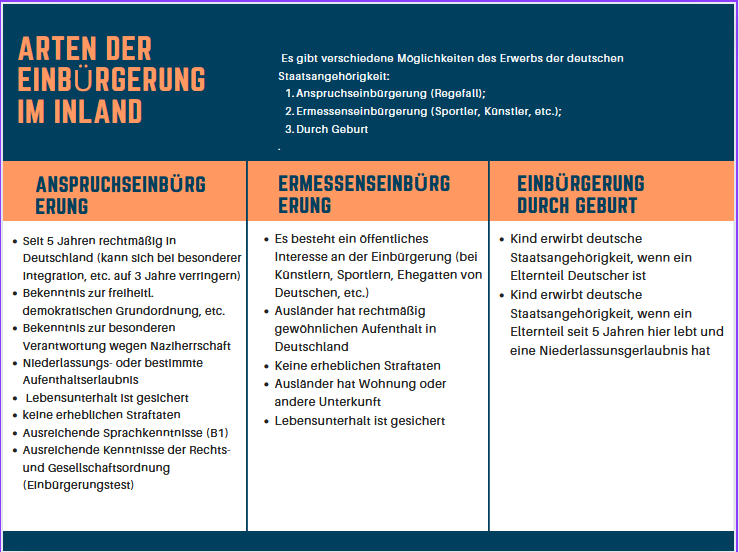Requirements for the Naturalization of Foreign Nationals in Germany
To be naturalized as a foreign national into German citizenship, certain requirements must be met. Both discretionary and entitlement naturalization require that the foreign national has not been convicted of an unlawful act.
No Independent Review of the Criminal Offense by the Naturalization Authority
An unlawful act is one that fulfills the elements of a criminal law offense (see Section 11(1) No. 5 of the German Criminal Code). It is important to note that the naturalization authority is not permitted to independently review the criminal offense. It must fully rely on the decision of the criminal court. Therefore, the applicant should avoid downplaying or trivializing their criminal conviction when dealing with the authority, as this could damage their credibility.
Disclosure of All Criminal Offenses and Ongoing Investigations Required
In the naturalization process, all previous convictions and ongoing investigations must be disclosed. The naturalization authority will independently request information from the Federal Central Criminal Register to check for any prior convictions. If it is discovered that the applicant lied when submitting their application, this lie alone can lead to the rejection of the naturalization application.
Criminal Offenses That Do Not Prevent Naturalization
Not every prior conviction leads to the rejection of naturalization. According to Section 12a of the Nationality Act (StAG), convictions for fines of up to 90 daily rates and custodial sentences of up to three months that are suspended on probation are disregarded. If the conviction slightly exceeds these limits, the naturalization authority has some discretion. However, for a conviction involving a fine of 120 daily rates, this discretion is no longer applicable.
Is a Clean Criminal Record Certificate Sufficient?
For naturalization, it is not sufficient that nothing is recorded in the police clearance certificate. Not all convictions are included in the police clearance certificate (see Section 32 of the Federal Central Criminal Register Act, BZRG). However, entries that are not included in the clearance certificate can still be disclosed to the naturalization authorities (Section 41(1) No. 6 BZRG). What is decisive is whether the entry still appears in the Federal Central Criminal Register. The deletion periods range from five to twenty years (Section 46 BZRG). According to Section 51 BZRG, an offense and the conviction can no longer be used against the person once the entry has been deleted from the register.
Hate Crimes as a Reason for Rejecting Naturalization
Hate crimes against Jews (antisemitism) or the glorification of Nazi rule can also lead to the rejection of naturalization. According to Section 130 of the German Criminal Code (StGB), a foreign national who incites hatred against Jews or Israel can be sentenced to a fine or imprisonment. Beyond a certain severity, this conviction can result in the rejection of naturalization.

Important Note: The content of this article has been prepared to the best of our knowledge and belief. However, due to the complexity and constant evolution of the subject matter, we must exclude liability and warranty. Important Notice: The content of this article has been created to the best of our knowledge and understanding. However, due to the complexity and constant changes in the subject matter, we must exclude any liability and warranty.
If you need legal advice, please feel free to call us at 0221 - 80187670 or send us an email at or send an email to info@mth-partner.de info@mth-partner.de
Lawyers in Cologne advise and represent clients nationwide in immigration law.

